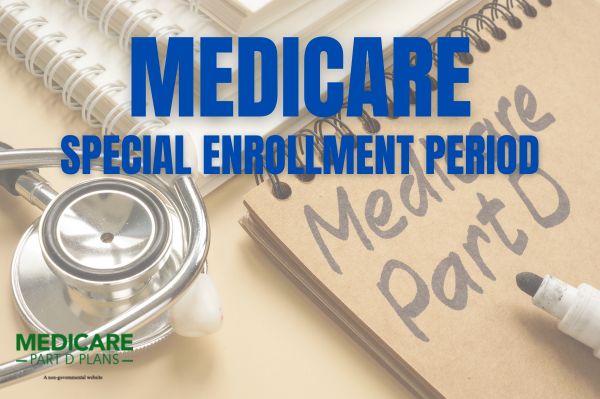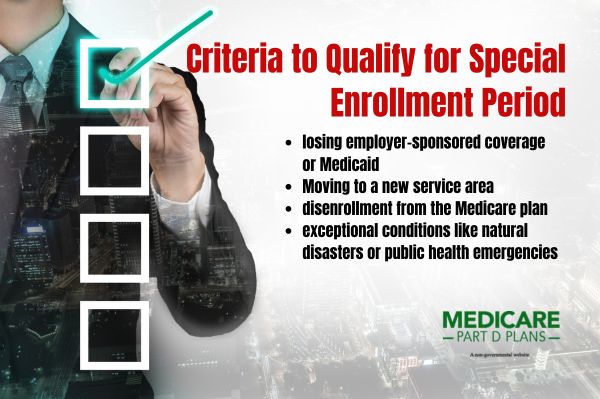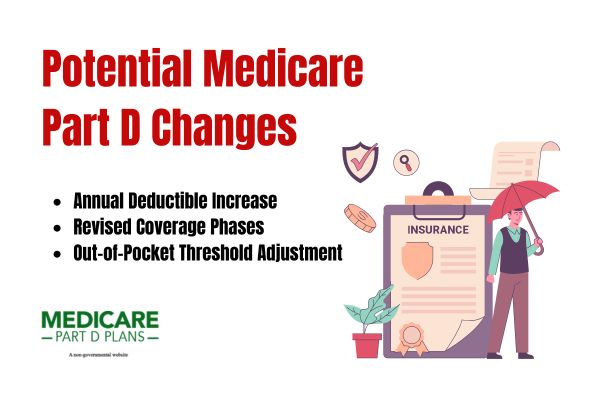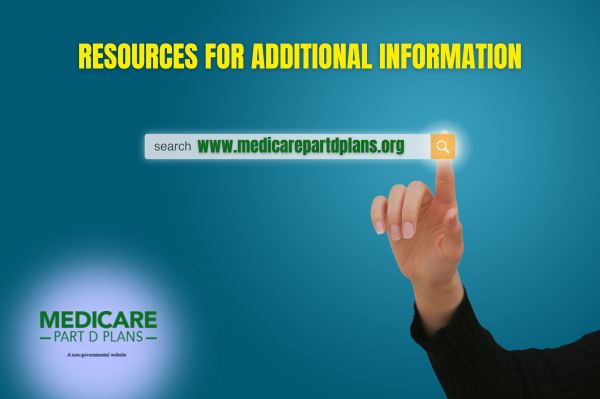Find a Medicare Part D prescription drug plan

Medicare Part D
Prescription Drug Coverage 2026
Medicare Part D Special Enrollment Period 2026
The Medicare Part D Special Enrollment Period
If you’ve encountered specific life events, such as losing other coverage or moving to a new service area, the Medicare Part D Special Enrollment Period may allow you to update your plan without facing penalties. This article will guide you through eligibility criteria, application processes, and potential changes you should know for the upcoming SEP.
Key Takeaways
- The
2026 Special Enrollment Period for Medicare Part D allows beneficiaries to make plan changes due to specific life events, helping avoid late enrollment penalties.
- Potential changes
for 2026 might include an increased annual deductible of around $615, revised coverage phases, and a out-of-pocket threshold of about $2,100, likely impacting beneficiaries’ costs.
- The Inflation Reduction Act will likely enable the federal government to negotiate drug prices, likely aimed at lowering prescription drug costs for Medicare beneficiaries.
Understanding the Medicare Part D Special Enrollment Period (SEP) 2026
The Special Enrollment Period (SEP) for Medicare Part D is a crucial window for Medicare beneficiaries to make changes to their plans without facing penalties. Missing this period may result in having to wait until the next General Enrollment Period and potentially incurring a penalty.
For many, this period will likely be a lifeline, allowing changes to be made due to specific life events or circumstances that fall outside the standard enrollment times.
Anyone navigating Medicare Part D should understand SEP. Whether losing employer-sponsored coverage or encountering exceptional conditions like natural disasters, knowing the qualifications for SEP could help maintain your Medicare prescription drug coverage.
Criteria for Qualifying for Special Enrollment Period
Qualifying for a Special Enrollment Period may stem from various life events. For instance, losing employer-sponsored coverage or Medicaid, moving to a new service area, or even disenrollment from a Medicare plan can make you eligible.
Such events allow changes to your Medicare coverage outside of the typical enrollment periods, providing flexibility when you need it the most.
Exceptional conditions like natural disasters or public health emergencies may also grant eligibility for SEP. If an emergency occurs, affected individuals may qualify for a two-month period to enroll in a Medicare plan after the event.
Additionally, if misinformation about your drug coverage impacts your enrollment, you could rectify the situation within two months of receiving notice of the misinformation.
Application Process for SEP in 2026
The application process for a Special Enrollment Period
Utilizing these resources can help ensure a smooth application process during SEP.
Avoiding Late Enrollment Penalties
Avoiding a late enrollment penalty will likely save money in the long run. Enrolling during a Special Enrollment Period may help beneficiaries avoid potential long-term penalties. Failing to qualify for SEP might lead to monthly penalties, so understanding and acting within the designated initial enrollment period is vital.
Beneficiaries may need to pay up to 100% of their covered prescription drug costs until the listed deductible has been met. Enrolling during SEP could potentially reduce overall costs and avoid penalties, possibly ensuring continued prescription drug coverage without extra financial burdens.
Potential Changes to Medicare Part D in 2026
The year
These changes will likely be designed to enhance affordability and potentially reduce the financial burden on Medicare beneficiaries.
Among the possible changes may be an increase in the annual deductible, revised coverage phases, and an adjustment to the out-of-pocket threshold. Each of these changes might impact how beneficiaries manage their prescription drug costs and coverage in the coming year. Staying informed about these updates could be vital for anyone relying on Medicare Part D.
Annual Deductible Increase
One of the potential changes might be the increase in the annual deductible for Medicare Part D, which may be set around $615. This deductible is an out-of-pocket amount that beneficiaries may need to pay before their Medicare Part D coverage begins. Additionally, understanding the role of deductibles in Medicare could help beneficiaries better navigate their healthcare costs.
Understanding and planning for this potential increase may help chronically ill beneficiaries manage their healthcare costs more effectively.
Revised Coverage Phases
The coverage phases for Medicare Part D may also be revised
During the catastrophic phase, enrollees might not need to pay cost sharing for covered Part D drugs, while plan sponsors may pay up to 60% of the costs of covered Part D drugs.
This phase could potentially provide comprehensive coverage for high-cost medications, possibly ensuring that beneficiaries may not be overwhelmed by out-of-pocket expenses.
Out-of-Pocket Threshold Adjustment
This adjustment might cap the maximum out-of-pocket expenses, possibly providing financial relief and predictability for beneficiaries.
How the Inflation Reduction Act Might Affect Medicare Part D in 2026
The Inflation Reduction Act of 2022 may introduce several changes that could affect Medicare Part D, likely focused on lower drug costs and enhancing affordability for beneficiaries. One of the potential changes might be the ability for the federal government to negotiate prices for select high-cost drugs covered under Medicare Part D.
These negotiations could potentially reduce out-of-pocket expenses for Medicare beneficiaries.
Selected Drug Subsidy
Under the Inflation Reduction Act, selected drugs might receive a government subsidy equal up to 10% of their negotiated price starting
The subsidies may also help ensure that beneficiaries could benefit from their necessary prescriptions without financial strain.
Potential Impact on Prescription Drug Costs
The Inflation Reduction Act’s subsidies may lower overall prescription drug expenses for Medicare beneficiaries, especially for those who haven’t reached their out-of-pocket spending limit. These subsidies could potentially reduce prescription drug costs, possibly provide financial relief and making medications more affordable.
Provisions such as price negotiations and rebates on drug price may be projected to potentially lower out-of-pocket Medicare costs for Original Medicare beneficiaries.
Maximizing Benefits During the Open Enrollment Period
The open enrollment period for Medicare runs from October 7 to December 15 each year. Beneficiaries should evaluate their current plan offerings and consider modifying their coverage during this time.
This period will likely be an opportunity to help ensure that your Medicare plan continues to meet your healthcare needs and provide the best possible Medicare Advantage benefits.
Reviewing Your Current Coverage
Beneficiaries should compare their existing Medicare Part D plan with options available during the enrollment period to ensure it meets their healthcare needs. Evaluating potential changes in drug coverage and premiums for the upcoming year could help make informed decisions about Medicare coverage.
Consulting with Our Licensed Agents
Our licensed agents can tailor plan recommendations based on individual health needs, providing valuable insights into different Medicare plans. Working closely with our agents can help ensure you select the best coverage for your needs.
Our agents are knowledgeable about the latest plan updates and eligibility criteria, providing personalized assistance to help navigate your Medicare options. Call them at 1-866-930-4039 (TTY 711) Mon-Fri: 8am-8pm EST.
Verifying Medication Coverage
Verifying that all required prescription medications might be included in your chosen Medicare plan may be crucial for maintaining necessary health care. Confirming that your prescribed medications may be in the new plan’s formulary could help avoid unexpected costs.
This verification could potentially prevent any disruptions in your treatment.
See plans in your area instantly!
Advertisement
Special Situations and Exceptions
Certain emergencies may qualify individuals for a Special Enrollment Period (SEP) to enroll in Medicare. Individuals have up to 6 months after losing Medicaid coverage to enroll in Medicare during a Special Enrollment Period.
Enrollees of Medicare Savings Programs may also get help through the Low-Income Subsidy program. This assistance could potentially reduce certain prescription drug costs. Understanding these unique scenarios could ensure that beneficiaries may maintain their coverage without facing penalties.
Emergency Situations
Emergencies may also trigger a Special Enrollment Period, allowing individuals to enroll in Medicare Part D outside regular enrollment periods. Exceptional circumstances beyond an individual’s control may qualify for SEP, though documentation may be required.
This could potentially ensure that beneficiaries affected by emergencies may still access their Medicare benefits.
Other Exceptional Conditions
Additional scenarios beyond the typical ones may grant eligibility for a Special Enrollment Period, assessed on a case-by-case basis. If you miss a chance to sign up due to exceptional conditions, contact Social Security to request a Special Benefits Enrollment Period.
This flexibility likely ensures that beneficiaries can maintain their coverage.
Resources for Additional Information
For detailed information about Medicare Part D, beneficiaries should consult this website and our licensed agents. Using these resources provides comprehensive guidance on navigating the potential Medicare changes and making informed decisions about your coverage.
Our Website
By entering your zip code into the Plan Finder Tool on this website, members can get access to information and guidance regarding Medicare benefits and enrollment processes. Comprehensive information about Medicare Part D, including eligibility and enrollment, is available through this website.
Our website offers detailed guides and resources about Medicare coverage options, likely to ensure that beneficiaries have access to accurate and up-to-date information.
Find a Plan and Enroll Online Yourself!
Advertisement
Summary
As we approach
By knowing the criteria for qualifying for SEP, the application process, and how to avoid late enrollment penalties, beneficiaries will likely maintain their prescription drug coverage and possibly save money.
The Inflation Reduction Act might bring several changes, such as the negotiation of drug prices and adjusted out-of-pocket thresholds. By staying informed and taking advantage of the open enrollment period, beneficiaries could potentially maximize their benefits and ensure their healthcare needs are met.
Remember to consult this website and our licensed agents for the most accurate and up-to-date information. Stay proactive and make the most of the opportunities available to you.
Frequently Asked Questions
What is the Special Enrollment Period (SEP) for Medicare Part D?
The Special Enrollment Period (SEP) for Medicare Part D allows beneficiaries to enroll in or change their plans without penalties due to specific life events, such as losing job-based coverage or relocating. It’s essential to be aware of these timeframes to ensure you have the necessary medication coverage.
How can I apply for SEP in 2026 ?
To apply for SEP
What are the possible changes to Medicare Part D in 2026 ?
Possible changes to Medicare Part D might include an increased annual deductible of around $615, revised coverage phases with up to 25% coinsurance in the initial phase, and an adjusted out-of-pocket threshold of about $2,100. These potential modifications could potentially enhance the cost predictability for enrollees.
How might the Inflation Reduction Act affect Medicare Part D?
The Inflation Reduction Act could potentially enhance Medicare Part D by allowing the government to negotiate prices for selected high-cost drugs and may provide subsidies, which might reduce certain prescription drug costs for beneficiaries.
These potential changes will likely be designed to make essential medications more affordable for seniors.
What resources are available for more information on Medicare Part D?
For comprehensive information on Medicare Part D, use this website or call our licensed agents using the number on this website.
Begin Choosing your plan
Advertisement
ZRN Health & Financial Services, LLC, a Texas limited liability company.





